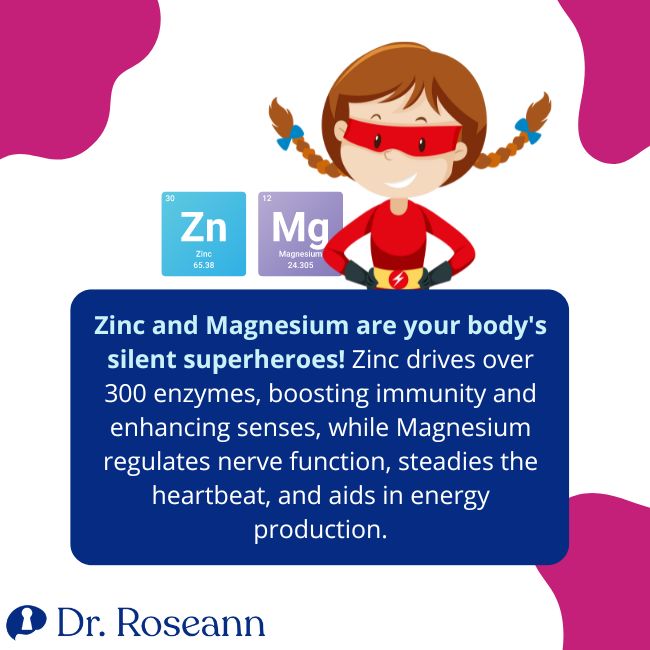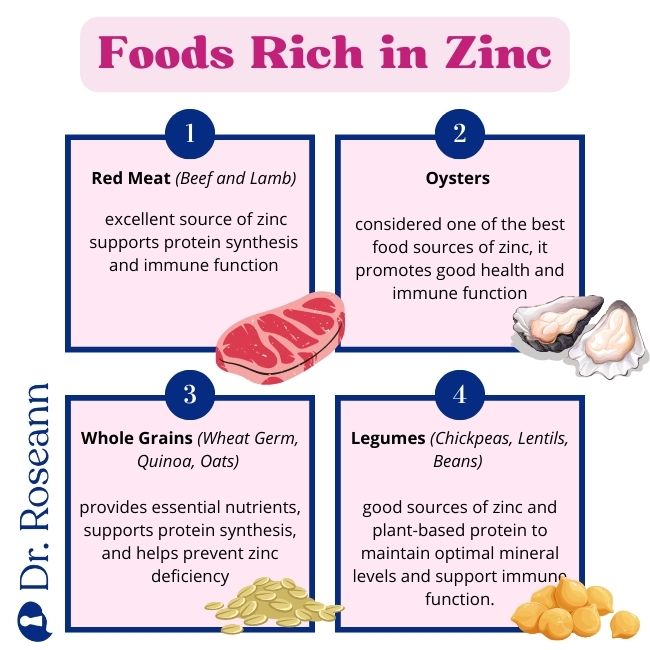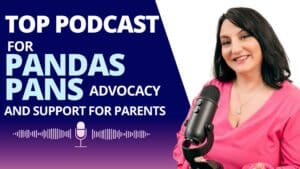Because we're in the battle against mental health and behavioral issues, we need allies. We find them in zinc and magnesium, essential minerals in brain health. They work tirelessly to support attention, mood, stress, and behavior in children and teens struggling with ADHD, anxiety, autism, OCD, mood swings, and those troublesome PANS and PANDAS.
Zinc and magnesium are no joke regarding their role in our bodies. Zinc swoops in to save the day and boosts cognitive function, improving focus and even reducing hyperactivity. Meanwhile, magnesium is the guardian of calmness, alleviating anxiety, stress, and mood swings like a champion. These minerals are the dynamic duo your child's brain needs to thrive!
Zinc and magnesium are your body's silent superheroes. Zinc drives over 300 enzymes, boosting immunity and enhancing senses, while Magnesium regulates nerve function, steadies the heartbeat, manages blood pressure, and aids in energy production.
How Do Zinc and Magnesium Work in the Body?

One of zinc's critical functions is supporting immune function. When zinc deficiency rears its ugly head, it can lead to weakened immunity, leaving your child vulnerable to villainous invaders.
The role of zinc in protein synthesis is paramount, as it helps our bodies to build and repair tissues. It's like the master architect overseeing the construction of strong bones, muscle growth, and tissue regeneration. Without enough zinc, our little heroes may experience cramps, slow muscle recovery, and compromised bone health. We can't have that!
Now, let's talk about brain power. Zinc collaborates with magnesium to support cognitive function, attention, and mood regulation. Together, this dynamic duo of brain health ensures our children have the mental agility to conquer any challenge that comes their way.
Magnesium, on the other hand, is like a calming force amidst the chaos. It ensures that our children's bodies are functioning at their best. It plays an important role in more than 300 enzymatic reactions, forming strong bones and supporting muscle function. Magnesium also helps maintain a balanced mood and sleep quality, offering a soothing embrace when the world feels overwhelming.
I know of a young adult named Jane who led a busy life. Despite her best efforts to lead a healthy lifestyle, she started experiencing troubling symptoms related to her mental health. Jane often felt anxious, tired, and had trouble concentrating.
Concerned about her condition, Jane asked me about her situation. Supplementation with magnesium and zinc is one of the many things I recommended to boost her brain function and emotional well-being.
Signs of Magnesium and Zinc Deficiency
The absence of these essential nutrients in the body can cause an uproar. Zinc and magnesium deficiency can tip the scales of good health. For example, if your child is experiencing muscle cramps, it might be a sign that their magnesium levels are too low.
The same is true if they suffer from poor sleep quality. Finding your child tossing and turning in distress at night can signal magnesium deficiency. Low magnesium levels can disrupt their peaceful slumber, leaving them exhausted and far from being their best self in the morning.
Like magnesium, zinc deficiency can lead to the disruption of harmony within our children's bodies. If their immune function is low, frequent colds and infections can take them down. Our kids need enough zinc to strengthen their immune defenses and avoid illnesses.
Zinc also plays a crucial role in mood regulation, and its absence can create a storm of mood disorders and emotional struggles. If your little one seems to be in a perpetual state of irritability, anxiety, or even depression, it could be zinc deficiency. They may need zinc to restore balance and bring back their sunshine.
Can I Take Zinc and Magnesium Together?
This age-old compatibility question always arises with zinc and magnesium. So, can these two essential nutrients coexist in harmony within our bodies? It's time to uncover the truth behind their relationship.
The short answer is a resounding yes! You can take zinc and magnesium together, and they make quite the dynamic duo for promoting optimal health. Both play vital roles in the human body, and their combined forces offer many benefits that can support our overall well-being.
Zinc collaborates with magnesium to support cognitive function, attention,, and mood regulation (Huss et al., 2010). These minerals boost brain health by ensuring our children have the mental agility to conquer any mental health challenge that comes their way.
However, let us remember the importance of balance. While taking zinc and magnesium together offers numerous benefits, you must ensure you are within recommended doses. High doses of zinc or magnesium supplementation can have adverse effects and disrupt the delicate equilibrium within our bodies. Consult a healthcare provider for the appropriate dosage and supplementation for your needs.
Benefits of Taking Zinc and Magnesium Together
Prepare to be captivated by the extraordinary benefits that unfold when two remarkable minerals, zinc and magnesium, join forces! Together, they create an effect that elevates our well-being to new heights. Let's discuss their roles in different bodily functions.
Strengthened Immune System
Let's talk about the immune system. Picture zinc as the valiant defender crucial in fortifying our immune function. But when magnesium steps onto the scene, a remarkable transformation occurs.
Magnesium enhances the absorption and utilization of zinc, allowing it to unleash its immune-boosting potential even more effectively. This combination equips our bodies with the necessary tools to protect against external threats and maintain a healthy immune system.
Faster Muscle Repair
Now, let's shift our focus to muscle strength and growth. Zinc takes the spotlight here, showcasing its muscle development and repair prowess. It ensures that our muscles receive the necessary nutrients to perform at their peak and recover optimally.
Then, magnesium gets into the picture, adding flair to zinc's performance. It aids in muscle relaxation and contraction, promoting strength and reducing the risk of those pesky cramps. Zinc and magnesium create an environment that nurtures muscle health, empowering us to excel in athletic endeavors and everyday activities.
Better Bone Health
Now let's dive into their impact on bone health. Imagine zinc as the master collaborator in producing collagen, a key component of our bone tissue. It ensures our bones stay strong and resilient.
Magnesium acts like the conductor that facilitates the metabolism and absorption of calcium, which is crucial for maintaining optimal bone density. Zinc and magnesium form a rock-solid foundation for healthy bones, safeguarding our skeletal system with unwavering strength.
Enhanced Mood and Sleep
Brace yourself for the extraordinary influence of zinc and magnesium on mood and sleep. Zinc deficiency has been associated to a significant increase of mood disorders, while magnesium deficiency can disrupt sleep quality and lead to insomnia (Rondanelli et al., 2011).
However, when these two mighty minerals unite, they work harmoniously to support balanced moods and enhance the quality of our sleep. The result? Our children are better equipped to go through their activities throughout the day.
Recommended Dosage of Zinc and Magnesium
When it comes to ensuring the optimal health of our little ones, determining the proper dosage of essential minerals like magnesium and zinc is of utmost importance. These minerals are vital in supporting our kids' growth, immune function, and overall well-being.
While the recommended dosage for zinc varies depending on age, a general guideline suggests a daily intake of 2-5 mg for infants aged 7-12 months and 3-8 mg for children aged 1-8 years. However, it is essential to note that individual factors, such as specific health conditions, may require higher or lower dosages.
Moving on to magnesium, the recommended daily intake for children also varies based on age. Generally, children aged 1-3 years may require around 80-130 mg, while children aged 4-8 years may need approximately 130-240 mg.
Again, individual considerations, including any underlying health concerns, may influence the optimal dosage. Seeking guidance from a healthcare professional or pediatrician will help ensure your child receives the ideal magnesium and zinc dosage for their specific requirements.
As with any vitamin and mineral, it is essential to exercise caution and avoid excessive doses. While the health benefits of magnesium and zinc are enormous, excessively high amounts can adversely affect children. Some good sources of zinc include beef, lamb, and oysters, among others.
Foods Rich in Zinc

- Red Meat (Beef and Lamb) – an excellent source of zinc; supports protein synthesis and immune function
- Oysters – considered one of the best food sources of zinc, it promotes good health and immune function
- Whole Grains (Wheat Germ, Quinoa, Oats) – provide essential nutrients, support protein synthesis, and help prevent zinc deficiency
- Legumes (Chickpeas, Lentils, Beans) – good sources of zinc and plant-based protein to maintain optimal mineral levels and support immune function.
Foods Rich in Magnesium
- Dark Leafy Greens (Spinach, Kale) – nutritional powerhouses, high in magnesium, support strong bones, muscle function, and overall vitality.
- Nuts and Seeds (Almonds, Pumpkin Seeds) – crunchy and delicious, rich in magnesium, it supports bone health and muscle growth.
- Whole Grains (Brown Rice, Whole Wheat Bread) – are staples in a balanced diet, contribute to magnesium intake, and support a healthy magnesium balance in the body.
- Dairy Products (Milk, Yogurt) – contains magnesium and calcium, supporting strong bones and muscle function.
Should You Take Zinc and Magnesium Before Bed?
Are you curious about the benefits of taking zinc and magnesium before bed? We all know by now how magnesium and zinc play vital roles in the body to support various bodily functions. But when's the right time to take them?
There are a few compelling reasons to take zinc and magnesium before bed. Firstly, magnesium has a calming effect on the body. It promotes relaxation and aids in regulating sleep-wake cycles.
When your kids take magnesium before bed, you may experience a night of more restful and rejuvenating sleep. They'll awake feeling refreshed and feel revitalized during the day. But only if it's the right form of magnesium to begin with.
Additionally, zinc benefits the body by also enhancing sleep quality and duration. Studies have shown that individuals with low levels of zinc may experience sleep disturbances, and zinc supplementation has been found to alleviate these issues (Cherasse & Urade, 2017). Ensuring sufficient zinc intake before bedtime may support better sleep patterns and enhance the overall sleep experience.
It's worth mentioning that the timing of mineral intake is crucial. Taking zinc and magnesium before bed allows the body to absorb and utilize these essential minerals during the overnight restorative processes.
However, avoid high doses of zinc and magnesium close to bedtime, as they may cause digestive discomfort in some children. Striking a balance and adhering to the recommended dosages is vital to maximizing the benefits of these minerals.
But while combining zinc and magnesium supplements can significantly amplify the benefits, remember that individual responses may vary. Before starting any new supplementation regimen, consulting with a healthcare professional is always recommended.
Returning to Jane's story, she also adopted stress-management techniques, such as practicing mindfulness and engaging in regular physical activities. She prioritized sleep, ensuring she got enough restorative rest each night. In addition, Jane explored neurofeedback training and PEMF.
As weeks passed, Jane noticed a remarkable transformation within herself. Her anxiety lessened, and she experienced a newfound sense of calm. As Jane's energy levels improved, her mental clarity and focus were restored. Jane's overall mood lifted, and she began to enjoy life again.
Our BrainBehaviorResetTM Program offers a transformative approach to addressing mental health symptoms by focusing on natural solutions to mental health, such as neurofeedback therapy, CALM PEMF, mineral supplements, and lifestyle changes. By incorporating these solutions, your child can experience optimal brain health, improved behavior, and renewed vitality and happiness.
Parent Action Steps
✅ Take our Solution Matcher to get personalized support for your child's brain health.
✅ Understand the importance of zinc and magnesium for your child's brain health.
✅ Recognize signs of zinc and magnesium deficiency.
✅ Consult with a healthcare professional for appropriate dosage.
✅ Create a balanced diet with nutrient-rich foods for adequate zinc and magnesium.
✅ Consider zinc and magnesium supplementation if the diet lacks these minerals.
✅ Understand the potential side effects of high doses and use caution.
✅ Prioritize sleep quality for better brain rest.
✅ Implement lifestyle changes: reduce stress, regular physical activity.
✅ Monitor progress and consult healthcare professionals if needed.
Citations
Cherasse, Y., & Urade, Y. (2017). Dietary Zinc Acts as a Sleep Modulator. International Journal of Molecular Sciences, 18(11), 2334. https://doi.org/10.3390/ijms18112334
Huss, M., Völp, A., & Stauss-Grabo, M. (2010). Supplementation of polyunsaturated fatty acids, magnesium and zinc in children seeking medical advice for attention-deficit/hyperactivity problems – an observational cohort study. Lipids in Health and Disease, 9(1), 105. https://doi.org/10.1186/1476-511x-9-105
Rondanelli, M., Opizzi, A., Monteferrario, F., Antoniello, N., Manni, R., & Klersy, C. (2011). The effect of melatonin, magnesium, and zinc on primary insomnia in long-term care facility residents in Italy: a double-blind, placebo-controlled clinical trial. Journal of the American Geriatrics Society, 59(1), 82–90. https://doi.org/10.1111/j.1532-5415.2010.03232.x
Always remember… “Calm Brain, Happy Family™”
Are you looking for SOLUTIONS for your struggling child or teen?
Dr. Roseann and her team are all about solutions, so you are in the right place!
There are 3 ways to work with Dr. Roseann:
You can get her books for parents and professionals, including: It’s Gonna Be OK™: Proven Ways to Improve Your Child’s Mental Health, Teletherapy Toolkit™ and Brain Under Attack: A Resource For Parents and Caregivers of Children With PANS, PANDAS, and Autoimmune Encephalopathy.
If you are a business or organization that needs proactive guidance to support employee mental health or an organization looking for a brand representative, check out Dr. Roseann’s media page and professional speaking page to see how we can work together.
Dr. Roseann is a Children’s Mental Health Expert and Therapist who has been featured in/on hundreds of media outlets including, CBS, NBC, FOX News, PIX11 NYC, The New York Times, The Washington Post,, Business Insider, USA Today, CNET, Marth Stewart, and PARENTS. FORBES called her, “A thought leader in children’s mental health.”

She is the founder and director of The Global Institute of Children’s Mental Health and Dr. Roseann Capanna-Hodge. Dr. Roseann is a Board Certified Neurofeedback (BCN) Practitioner, a Board Member of the Northeast Region Biofeedback Society (NRBS), Certified Integrative Medicine Mental Health Provider (CMHIMP) and an Amen Clinic Certified Brain Health Coach. She is also a member of The International Lyme Disease and Associated Disease Society (ILADS), The American Psychological Association (APA), Anxiety and Depression Association of America (ADAA) National Association of School Psychologists (NASP), International OCD Foundation (IOCDF) International Society for Neurofeedback and Research (ISNR) and The Association of Applied Psychophysiology and Biofeedback (AAPB).
© Roseann-Capanna-Hodge, LLC 2023
Disclaimer: This article is not intended to give health advice and it is recommended to consult with a physician before beginning any new wellness regime. *The effectiveness of diagnosis and treatment vary by patient and condition. Dr. Roseann Capanna-Hodge, LLC does not guarantee certain results.













